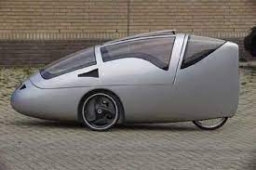You are using an out of date browser. It may not display this or other websites correctly.
You should upgrade or use an alternative browser.
You should upgrade or use an alternative browser.
"Sign" of the times
- Thread starter svetz
- Start date
svetz
Works in theory! Practice? That's something else
Not quite equivalent... keep in mind that ICE is 11-27% efficient at turning gasoline into miles whereas an EV is ~77% efficient. So....Just roughing some numbers; if a gallon of gas equals about 33kwh, .16¢ x 33 kwh = $5.28 per "gallon".
At $4.49/gallon in a 40 mpg ICE vehicle, the cost is $11.23 per 100 miles.
An EV is roughly 0.346 kWh/mile, so it takes 34.6kWh to go 100 miles, at 16¢/kWh that's $5.53 per 100 miles; so about half the cost of a 40 mpg ICE vehicle.
MurphyGuy
It just needs a bigger hammer
- Joined
- May 20, 2020
- Messages
- 4,129
Thank you.. A.Justice's post almost made my head explode with the faulty math.Not quite equivalent... keep in mind that ICE is 11-27% efficient at turning gasoline into miles whereas an EV is ~77% efficient. So....
At $4.49/gallon in a 40 mpg ICE vehicle, the cost is $11.23 per 100 miles.
An EV is roughly 0.346 kWh/mile, so it takes 34.6kWh to go 100 miles, at 16¢/kWh that's $5.53 per 100 miles; so about half the cost of a 40 mpg ICE vehicle.
It should also be noted that with an ICE, when you're in heavy stop-go traffic, the efficiency numbers plummet even more.
And if one installs solar, then the cost to charge an EV is free.
There are also a lot of employers who provide their employees with free charging stations as well. There's a large insurance company that does it in my local area, and I know a large electrical supply company that has 3 chargers that are free for all employees and customers as well.
Of course, its free now but I don't expect that to last forever.
svetz
Works in theory! Practice? That's something else
The math isn't faulty, it's the assumptions based on the units as to what the numbers actually mean.... almost made my head explode with the faulty math....
A standard 5-kilowatt generator will typically consume about 0.75 gallons per hour.
So that's 5 kWh / .75 = 6.7 kWh/gallon, and 6.7 kWh useful energy/ 33 kWh available energy = 20% efficiency.
Gasoline is an incredibly dense source of energy, but when we pay $4.49/gallon then $3.60 is just thrown away as heat in our generator example.
Seems like an awful lot of money to just throw away.
I don't have an EV, nor have I done much research on them, I appreciate the enlightenment on the differences.
I wonder if it would be a more efficient use of gasoline to have a gas generator direct charging an EV battery. I don't mean as any sort of permanent long-term option, but just hypothetically speaking. I still would like having the option to use gasoline or diesel to power my vehicle in SOME way during an emergency.
I wonder if it would be a more efficient use of gasoline to have a gas generator direct charging an EV battery. I don't mean as any sort of permanent long-term option, but just hypothetically speaking. I still would like having the option to use gasoline or diesel to power my vehicle in SOME way during an emergency.
svetz
Works in theory! Practice? That's something else
It's a tiny bit more efficient as the ICE engine can run at a single speed, but not anything to write home about.I wonder if it would be a more efficient use of gasoline to have a gas generator direct charging an EV battery.
My PHEV has three modes: EV mode (ECON), EV with some gas pep (Sport), Gas with EV pep (HV). In HV there's also an EV charging mode. It has a battery like an EV, but also a gasoline engine that kicks in for power assist or when the battery gets low. In normal usage, I generally worry about the gas in the tank getting "too old" as one tank can last me a long time with regular use; I just charge off solar. If the gas is more than 4 months old I do switch to HV mode. I've made several 1300 miles trips in it using HV mode and it runs great in any mode, very peppy.
MurphyGuy
It just needs a bigger hammer
- Joined
- May 20, 2020
- Messages
- 4,129
The key word is "typically", meaning in real actual use. In real actual use, a 5 kilowatt generator is never pumping out 5 kilowatts of energy, more like an average of about 2kW with short 3kW spikes.The math isn't faulty, it's the assumptions based on the units as to what the numbers actually mean.
A standard 5-kilowatt generator will typically consume about 0.75 gallons per hour.
Problem is, when a 6000 lb pickup truck runs into one of those toy boxes, there's only so much technology can do. Cars low to the road also endure more cracked wind shields, more road salt build up, and need far more aggressive wiper action in the rain.So that's 5 kWh / .75 = 6.7 kWh/gallon, and 6.7 kWh useful energy/ 33 kWh available energy = 20% efficiency.
Gasoline is an incredibly dense source of energy, but when we pay $4.49/gallon then $3.60 is just thrown away as heat in our generator example.
Seems like an awful lot of money to just throw away.
Makes me wonder about things like cars. They're at a pinnacle of current design, but isn't that design
questionable? Is there a way to keep passengers safer rather than to wrap them in mass?
If you could keep the passengers safe without all that mass you might get ultralight 200 mpg vehicles.
Impossible? Could crash detection could "eject" the passenger compartment during impact? Rather
than crumple, could the seats "surround" the passenger and the car "bounce". IDK, but maybe some
college kid will change the world.View attachment 106433
Possible and practical are two very different goals.
MurphyGuy
It just needs a bigger hammer
- Joined
- May 20, 2020
- Messages
- 4,129
The Chevy Volt, loved by almost all who own one, is an electric car with a small ICE. The first 20 miles you go is all battery, if you need to go further, the gasoline engine fires up to charge the battery.I don't have an EV, nor have I done much research on them, I appreciate the enlightenment on the differences.
I wonder if it would be a more efficient use of gasoline to have a gas generator direct charging an EV battery. I don't mean as any sort of permanent long-term option, but just hypothetically speaking. I still would like having the option to use gasoline or diesel to power my vehicle in SOME way during an emergency.
Leave it to General Motors to take a great idea that is popular with their customers and discontinue it. And that car used 2012 lithium tech. If they put one of the newer cells in there, it would probably have a 50 mile range just on battery power, which is enough to get most people back and forth to work with battery to spare.
svetz
Works in theory! Practice? That's something else
Sounds a lot like a missile hitting a jet... if only there was something technology could do to keep the occupants safe. I agree that F=ma can't be wished away, but as Mr. Miyagi says, meeting force with force isn't always the best way. The real truth is that as long as someone believes it can't be done, then it can't be done. |

|
The Cybertruck windshield is unbreakable. ; -) Could an air-dam or hydrophilic nano-coating be used to keep a windshield distortion free? Do we even need windshields? Possibly project an IR/lidar/radar computer-enhanced image onto glasses? | 
|
That's what engineers are for, to make the impossible practical. Putting men on the moon in the '60s was possible, but not practical. Today it's both.Possible and practical are two very different goals.
It's easy to say something is impossible or not practical and many do. What's hard is bucking the status quo, making it possible, and then getting it to be accepted. Progress makes all things possible. Did I mention I'm an optimist?
Last edited:
svetz
Works in theory! Practice? That's something else
It's not just GM. My PHEV is probably the best car we've ever owned, and Honda is discontinuing it. I was flabbergasted, the thing is a joy to drive.The Chevy Volt, loved by almost all who own one, is an electric car with a small ICE. The first 20 miles you go is all battery, if you need to go further, the gasoline engine fires up to charge the battery.
Leave it to General Motors to take a great idea that is popular with their customers and discontinue it.
Unlike the Volt, which had a lot of love, I don't think a lot of folks even knew the Clarity existed. I suspect it was poor sales from market confusion. The biggest gripe I ever heard was they didn't like the rear wheel cover and the info-tainment unit was out-of-date (my ICE vehicle doesn't even have one). Gripes about the steering are over-blown, drives way better and peppier than my ICE Mazda.
The official reason is Honda wants to concentrate on its upcoming line of EVs, take what they learned from their 13-year experiment (apparently it was available in Japan long before the U.S.) and apply it to new vehicles.
What I want to replace my existing ICE with is a (green) PHEV truck that has super-stabilized fuel (or a sensor for when it's going stale, or additives to perk it back up, or even a way to recycle it). All the miles when I need them, but mainly powered off the solar array. Keeping an eye on the Toyota Tacoma Prime and the Ram 4Xe.
Last edited:
What I want to replace my existing ICE with is a (green) PHEV truck that has super-stabilized fuel (or a sensor for when it's going stale, or additives to perk it back up, or even a way to recycle it). All the miles when I need them, but mainly powered off the solar array. Keeping an eye on the Toyota Tacoma Prime and the Ram 4Xe.
A propane (or CNG) powered engine would fit that bill. I think Ford has a CNG option for the Super Duty, but there's no EV option.
svetz
Works in theory! Practice? That's something else
I like the idea of CNG or propane since it won't go stale, but definitely want the "EV" in "PHEV".A propane (or CNG) powered engine would fit that bill. I think Ford has a CNG option for the Super Duty, but there's no EV option.
MurphyGuy
It just needs a bigger hammer
- Joined
- May 20, 2020
- Messages
- 4,129
I like the idea of CNG or propane since it won't go stale, but definitely want the "EV" in "PHEV".
With proper engineering, they could have really made a huge impact with CNG if done the way I had envisioned.
Imagine a natural gas compressor chiller in every home. An appliance the size of a refrigerator sitting outside the garage and connected to the home's natural gas supply.
It compresses the gas to fuel your car, and the waste heat that is removed from cooling the natural gas, could be used to warm the house in the winter and keep the hot water tank hot in the summer.
svetz
Works in theory! Practice? That's something else
Hydrogen might end up being better than propane or CNG.
It's meant for fuel-cell cars, but should work for a PHEV too. I like the idea of a fuel cell pickup truck, but their prices are still high because volumes are too low. Having a hydrogen fuel cell stack on a boat with solar hydrogen generation would be very sweet!A key provision of the Inflation Reduction Act gives a a $3 per kilogram tax credit to hydrogen produced with renewable energy and nuclear energy. The law will incentivize energy products to offer cleaner ways to make hydrogen, and end users to switch to hydrogen as a replacement for fossil fuels.
NEpowerandlight
New Member
- Joined
- Sep 15, 2022
- Messages
- 119
Don't worry the government will fix that imbalance.

 www.newsinenglish.no
www.newsinenglish.no

Electric car owners' costs jump - Norway's News in English — www.newsinenglish.no
UPDATED: Norwegian politicians have offered lots of electric car incentives over the years but they’re quickly disappearing, even as Norway urgently needs to cut carbon emissions. The latest electric car shock came just last week, when the City of Oslo nearly tripled the cost of recharging at...
Similar threads
- Replies
- 6
- Views
- 401
- Replies
- 9
- Views
- 276
- Replies
- 3
- Views
- 221




